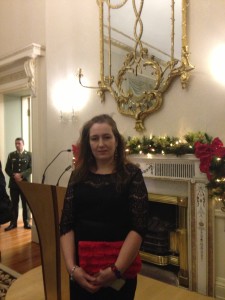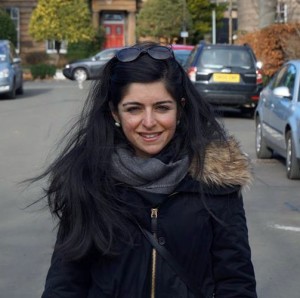‘Elites and the Making of Post-Soviet Nations: Nationalising Regimes in Kazakhstan and Latvia’
Diana T. Kudaibergenova
(Department of Sociology, University of Cambridge, 2015)
Supervisor: David Lane
Diana T. Kudaibergenova is a postdoctoral fellow at the Centre for Development Studies, POLIS Department, University of Cambridge. She was a Postdoctoral Researcher at the CERI Science Po, Paris, in the 2015–2016 academic year. Dr. Kudaibergenova is a political and cultural sociologist studying power and nationalism. She has published on nationalising regimes and ideologies and elites in Baltic States and Central Eurasia.
Dissertation abstract
The primary focus of this dissertation is to evaluate how and why various successor states and political elites choose to invest into more exclusive nationalist ideologies and policies regardless of the heterogeneous socio-cultural composition of their societies. Why are some newly independent states more nationalistic than others? What have been the driving forces behind exclusivist dominant discourse of nation-building in multi-ethnic post-Soviet states? The dissertation focuses on two very distinct elite regimes of post-Soviet Kazakhstan and Latvia to test the following hypothesis. If post-Soviet nation-building are elite-led projects which create and control the dominant discourses of nation-building, then the evolution of such discourses depend on both regime variations of elite selection (from democratic to non-democratic) and on the inner elite’s competition for power and resources within and outside such a regime. The study relies on more than 150 elite interviews collected in Latvia and Kazakhstan, extensive archival data and meticulous analysis of nation-building legislation and processes from 1989 to 2013.
The choice of the case studies was of a great importance where the Russian-speaking minority almost outnumbered indigenous titular ethnicity before and after the independence in 1991. In more electoral democratic Latvia where the consolidation of pro-Latvian elites had pursued and developed a very exclusivist citizenship and nation-building policies, the regime failed to comply with the demands of its Russian-speaking minority even in matters of minority education or state language provisions. In a less democratic Kazakhstan the Russian-speaking minority was treated differently. Since the declaration of independence in 1991, the universal citizenship, duality of state (Kazakh) and official (Russian) languages, and minority language schools in which Russophone education dominated was promoted and became the flag-bearer of the Nazarbayev regime’s multicultural policy.
The concept of ‘nationalising regime’ is applied to study these processes of elitist nation-building projects, intra-elite competitions and legitimacy building for ideological regimes (Latvia) or personalized regimes (Kazakhstan). The concept of nationalising regime is a framework of decision-making in nation-building processes that is governed by specific elitist interests groups and networks within and outside the given country. The thesis examines the mechanisms and effects of these nationalising regimes on the society, polity and the democratic process.
Inspiration to undertake this research
I have always been interested in nationalism and the complex social dynamics behind nationalist movements. After completing the M.A. program in International and Intercultural Relations in the heart of the Basque Country, in Bilbao, I decided to explore these research questions to include them in my doctoral dissertation and shift the focus to the new so-called successor states. Studying two very different post-Soviet states in a comparative perspective sounded like a novel idea to me. I wanted to find out why some states engage in more nationalistic policies and discourses despite having almost similar ethnic divisions in the society. The context of the Russian-speaking population and bilingual or monolingual Russian speakers’ ratio is very similar in both Latvia and Kazakhstan. Yet Latvia, a European state with electoral democracy has far more restrictive citizenship and language policies and laws than does Kazakhstan. Doing fieldwork in Latvia and studying Latvian language was another great motivation and inspiration behind this project. I aimed at providing an interesting and unusual comparative perspective beyond regional and area-based distinctions in post-communist studies. Most importantly, I wanted to expand the conceptual apparatus by stepping out of ‘Central Asian’ or ‘Eastern European’ studies and combining the two from the perspective of political and historical sociology.
An in-depth look into one aspect of the dissertation
I use the concept of ‘nationalising regimes’ in the dissertation, defined as fields of power struggles centred on the dominant discourses of the nation. Nationalism in post-communist states have substituted the old ideologies of communism which have become the dominant discursive field for the power elites to compete for the spheres of their interests and political power. I argue that this requires a detailed conceptualisation in an in-depth historical perspective with the use of contemporary political ethnography to explain how these processes diverge in different political regimes.
The analysis of the Latvian case allowed me to conclude that a stable nationalising regime was characterised by the static agenda of the national discourses and frameworks which had been constructed and agreed to by the dominant elites prior to independence. The dominant elites in this context were defined by the dominant (Latvian) ethnicity and culture. Non-Latvian elites had little chance to intervene in the 1990s with the restrictive Citizenship Law and limited quotas for naturalisation which meant that old Russian or other non-Latvian elites were able to run for office only at the beginning of the 2000s (the naturalisation quota based on the age groups from youngest to older groups was abandoned in 1998). However, even with the abolition of quotas for naturalisation many non-Latvian aspiring elites have found themselves in a difficult situation of addressing a marginal electorate with their non-Latvian agenda. Even today almost a quarter of Latvian permanent residents do not have access to their political rights as they are circumvented from the Latvian citizenship and remain in the status of non-citizens – permanent residents of Latvia with no political rights. This contextualises the pro-Latvian electoral participation and narrows down the pro-Russian political competition.
In Kazakhstan, the nationalising regime does not depend so much on the ethnic or even ethno-lingual groups, which has been the case in Latvia. There also has been little transformation of the ruling elite from the communist to post-communist context. This has taken further development of the nationalising regime away from just one dominant discourse and narrative. The interests of the power elites have been directly linked to the economic development of the country which has also influenced and directed the development of the compartmentalized ideology. The nationalising regime in Kazakhstan is also more personalised, where power elites tend to be more stable and are formed in special competing fields or circles which are also usually identified as clans. I prefer calling them financial political groups of influence, a term used locally by the political analysts (Dosym Satpayev termed them lobby groups in the late 1990s). The survival rate of these groups of influence is dependent upon an affinity to the Nazarbayev regime, which is typical for the authoritarian regimes in general. However, the Kazakh case presents a hybrid regime, with the elements of democratic development and the persistence of formal institutions, such as political parties but also the domineering agenda of the power elites centered on the presidential circle. These elites depend upon the discourses of stability and development provided by the stability of the presidential power.
Perspective on the fields of nationalism, ethnicity, and race
At present there is a lack in both comparative studies of nationalism but also an absence of work reconceptualising post-Soviet nationalism. The framework of nationalising states (Brubaker 1994, 1996 and 2011) remains one of the few analytical tools; however, the growing interest and analysis of elite power requires a more detailed and adequate tool of analysis. Power intersections and power struggles cannot be explained simply through the state-centric paradigms but require more detailed and scrutinized frameworks of regime structures and elite fragmentations, competitions and settlements. Post-communist studies also suffer from the ‘transition’ studies, when perhaps historical sociology might be more useful for the analysis of current affairs and political development. The persistence of the ‘post’ agenda and limitations in political geographical comparisons and studies also continue to limit more fruitful analyses in the study of one of the most exciting regions affected by contemporary nationalisms. This region in particular provides the space for more conceptual studies of space, ideologies, power and elites within the realm of nationalism studies and beyond. There is still a lot of work to be done with the current geopolitical order and it is essential to highlight the old narratives in order to bring into the open the new dimension of power struggles across this vast region and historical and ideological terrain.
For instance, there is a lack of substantive conceptual study of Kazakhstan’s diversified nation-building – the regime in Kazakhstan addresses a number of conflicting discourses all at once. The growing interest and expanding publication of the so-called Baltic postcolonialism allows it to tie the ‘postcolonial’ agenda of the former Soviet empire (there are at least three forthcoming works addressing this important issue anew) as a whole. The expanding ‘political postcolonial’ agenda in Poland reflects similar trends of the Latvian, Estonian and other post-Soviet discussions. Territorial claims and the importance of cultural narratives take over the agenda and require further analysis and conceptualisation in this vast region that may benefit from some unexpected yet productive comparisons across these countries.
Reflections on the job market
I have only been in the job market for a short period of time and so cannot provide anything useful at the moment, but I can provide some insight on some aspects of postdoctoral fellowships, which are very useful for interdisciplinary and inter-institutional collaborations and discussions. My interdisciplinary postdoctoral experience in Paris and Cambridge allowed me to reflect more on my doctoral work, expand my research agenda, and to focus on the two forthcoming book manuscripts. It also allowed me to collaborate with a number of colleagues and push forward many theoretical possibilities with which to address the varying questions posed in my current fieldwork.
If you recently defended a Ph.D. in the fields of nationalism, ethnicity, identity, and/or race and would like to be featured on our blog, please visit here for more information on how to submit your dissertation abstract.





